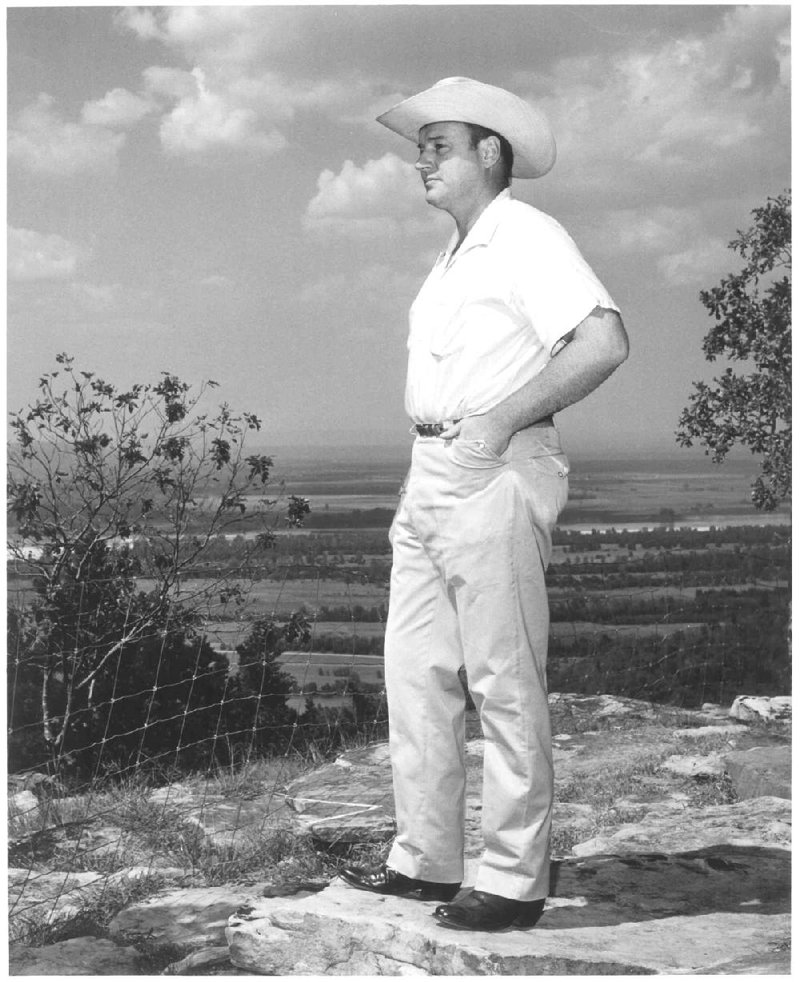Most mornings on my way to work, I drive by the hotel on Capitol Avenue in downtown Little Rock now known as the Legacy. In its day, when it was the Hotel Sam Peck, it was among the top hotels in the South. On summer days like this one, I often think of Gov. Winthrop Rockefeller as I pass the old building.
The Sam Peck was the place Rockefeller first called home when he fled to Arkansas from New York at the invitation of an Army friend named Frank Newell. Rockefeller's arrival date was June 9, 1953. Within a year, he had purchased a large tract atop Petit Jean Mountain and set out to create a model ranch. Ultimately, he would change an entire state.
I was at the hotel in 2003 when then-Lt. Gov. Winthrop Paul Rockefeller re-enacted his father checking into the hotel to mark the 50th anniversary. The lieutenant governor even used the suitcase his father had carried in 1953. In 1955, Winthrop Rockefeller accepted Gov. Orval Faubus' invitation to become the first chairman of the Arkansas Industrial Development Corp. and went to work reversing a long trend of population loss in the state.
The 2010, 2012 and 2014 election cycles changed the face of Arkansas politics. The Republican Party became the state's majority party for the first time since Reconstruction. The modern breed of Arkansas Republicans would do well on this 60th anniversary of Rockefeller taking over the state's economic development efforts to study this Republican who came here to escape the constant scrutiny of the Manhattan media.
Rockefeller had withdrawn from Yale University after three years and gone to the oil fields of Texas as an apprentice roughneck. He later would tell friends that it was one of the happiest periods of his life. Just as he had fallen in love with west Texas, he would fall in love with Arkansas and its people. In a letter to his son, Rockefeller wrote: "While we lived comfortably with that which we inherited and earned, we had the responsibility to see that these resources were also used wisely in the service to our fellow man."
In some respects, Petit Jean was the state capital during the four years Rockefeller served as governor from 1967-71. He preferred his ranch to the Capitol and would spend days at a time on the mountain, entertaining visitors from around the world. He wanted to be at the ranch with his prized Santa Gertrudis cattle and the majestic views of the Arkansas River Valley below. Former Arkansas Supreme Court Justice Bob Brown said at an event I attended on Petit Jean several years ago: "He wanted to make this a showcase so the world could see what could happen in Arkansas. He was economic royalty and this was his citadel."
It wasn't until the end of his four years in office that the list of Rockefeller's contributions could be appreciated. Only now, decades later, is the full impact of what he did to change this state being properly examined. William "Sonny" Walker, the man Rockefeller hired in 1967 to head the state's economic opportunity office, was believed to be the only black man in the cabinet of a Southern governor at that time. Walker once told me: "They just didn't do that back then, and they certainly didn't do it in the South. I had some of the same ideas that Rockefeller had. I just didn't have the money he had." The governor also set out to reform the Arkansas prison system, which Brown described as "a cesspool. Let's face it. Most of the prisoners were African Americans."
Dorothy Stuck, a former Marked Tree newspaper publisher who became one of Rockefeller's friends and advisers, said after his death: "It just amazed me how quickly he came to understand what we needed in this state. He opened the Capitol's front door and let a fresh wind blow through."
Rockefeller helped fund voter-registration drives designed to enfranchise black Arkansans. He also underwrote the Election Research Council, which trained lawyers to root out election fraud. On the Sunday after the Rev. Martin Luther King Jr. was assassinated in Memphis, Rockefeller joined black ministers on the front steps of the state Capitol. He held hands with the ministers as a crowd of almost 3,000 people sang "We Shall Overcome." No other Southern governor would make such a gesture.
"I don't think he knew the words to the song, but he was there," Walker said. "That's what mattered." Brown called it "his defining moment. He never gave up. That was the thing about him. Eventually the things he stood for prevailed."
Legislative defeats were common during the 1967 and 1969 legislative sessions. Stuck said those defeats hurt Rockefeller more than he would let on. "Although he didn't live to see it, the seeds he planted have come to fruition," she said. "What happened here radiated out across the country."
In April 1971, after Dale Bumpers had moved into the Governor's Mansion, Rockefeller was presented a silver plaque that was described as being from "the black people of Arkansas." It read: "Governor Winthrop Rockefeller, an inspiration to the young, a symbol of security for the old, full of love, warmth and compassion; a champion of human rights, brotherhood and dignity, who brought the Rockefeller family tradition to Arkansas and sacrificed time, resources, energy and public office for the causes of unity, justice and equality. Thank you for all you have done, for all you are doing to make our state the Land of Opportunity for all Arkansans. God bless you."
------------v------------
Freelance columnist Rex Nelson is the director of corporate communications for Simmons First National Corp. He's also the author of the Southern Fried blog at rexnelsonsouthernfried.com.
Editorial on 07/22/2015
